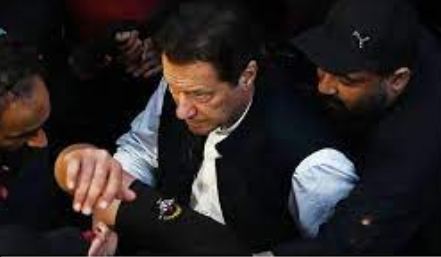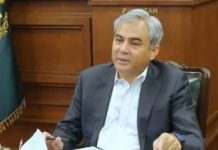Trial Court verdict
seems one-sided,
opines apex court
Court observes prima facie Imran Khan was not
heard properly; not given enough time to plead his case
Court Reporter
ISLAMABAD: ISLAMABAD: Chief Justice Umar Ata Bandial on Wednesday observed that the trial court judge announced the verdict in the Toshakhana case in haste.
The remarks from the top judge came during the hearing on a petition filed by former prime minister Imran Khan against a verdict of the Islamabad High Court (IHC) on the transfer of case to another court.
On August 4, the IHC annulled the sessions court’s verdict on the maintainability of the Toshakhana case against the PTI chief as a temporary relief to him but rejected his request to transfer the case to another court.
Later on August 5, Khan’s lawyer Khawaja Haris filed an application in the SC against the IHC’s decision, with a diary number attached to the petition.
The former premier was found guilty of corrupt practices in the Toshakhana case and sentenced to three-year.
The PTI chief’s plea is heard by a three-member apex bench comprising CJP Umar Ata Bandial, Justice Sayyed Mazahar Ali Akbar Naqvi and Justice Jamal Khan Mandokhel.
As the hearing commenced, chairman PTI’s lawyer Latif Khosa’s presented his arguments before the top court.
The chief justice came down hard on the trial court verdict, saying the judge announced the order in haste.
Khosa had prayed to the top court that his client had filed three appeals against the high court’s order.
“Six members of the National Assembly sent a reference against the PTI chairman to the speaker seeking his disqualification,” he said. “The speaker then sent the reference to the Election Commission of Pakistan (ECP) under Section 137 of the Election Act.”
Advocate Khosa prayed to the court that his client had been accused of misdeclaration of his assets. On the query of Justice Naqvi, Khosa read Section 137 and sub-section 4 of the Election Act, 2017.
“Do the members of the assembly have the authority to send a reference against their fellow members?” Justice Naqvi inquired. “Under which law can assembly members send references against other parliamentarians?”
To this, Khosa replied that members of the assembly did not have the authority to send the reference, only the NA speaker does. He further told the apex court that the electoral body could only take action against an MNA within a fixed time of 120 days after the submission of financial statements.
“The present case is not whether a reference could have been sent against Chairman PTI or not, Justice Mandokhel said. “You have challenged the decision of the Islamabad High Court.”
CJP Bandia also told lawyer Khosa that the issue of the case’s jurisdiction had been challenged.
“You yourself are saying that the case is pending in another court,” the CJP said.
After hearing arguments from Khosa and ECP counsel Amjad Pervaiz, the CJP Bandial remarked, “We will not interfere in the Toshakhana case today and we will look at the IHC hearing tomorrow and resume the hearing.”
In his appeal, the PTI chairman requested the SC to overturn the high court’s order directing Khan to reappear in the court of Additional Sessions Judge Humayun Dilawar.
He had requested that the trial court be restrained from holding proceedings till a verdict on the new petition is announced.
The petition further argued that the trial judge had “improperly and hastily” declared the Toshakhana case arguable, and that the IHC committed a legal error by sending back the case to Judge Dilawar.
“How can the judge, who has declared a case maintainable, freely rehear it,” the petition questioned, declaring that IHC Chief Justice Aamer Farooq had deprived the petitioner of his fundamental rights in the latest order.

















